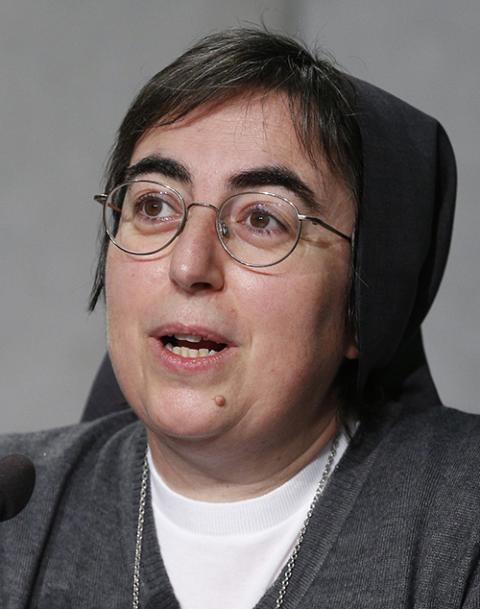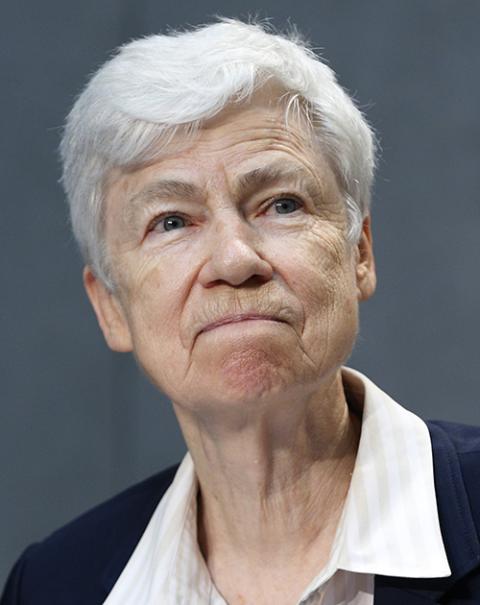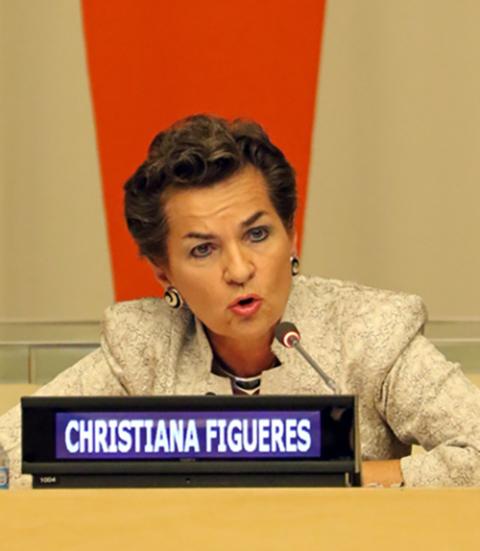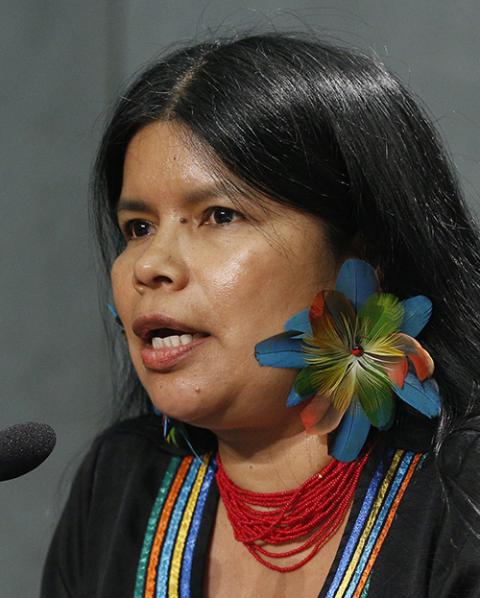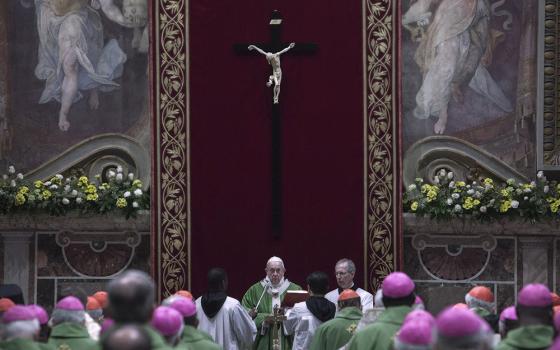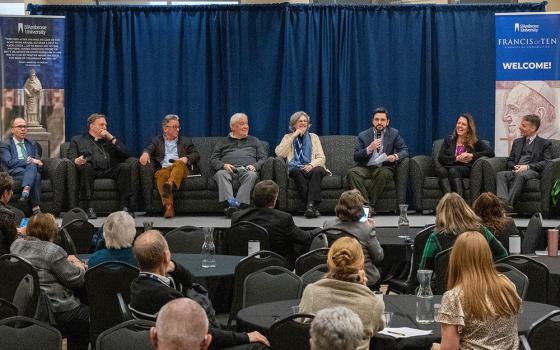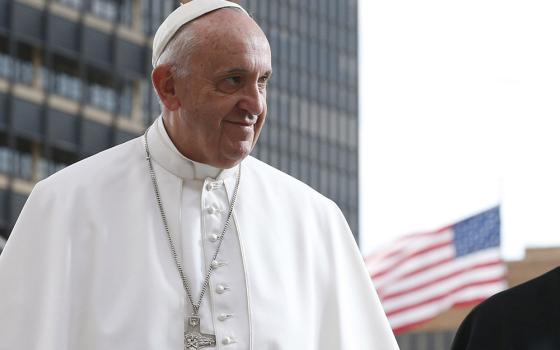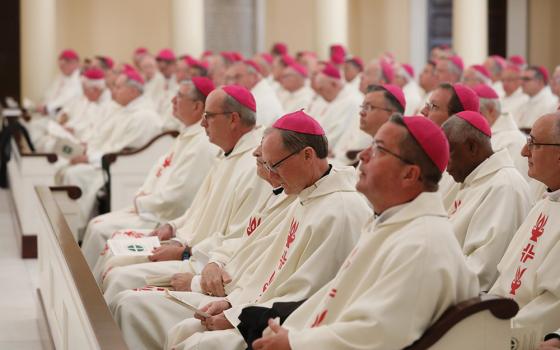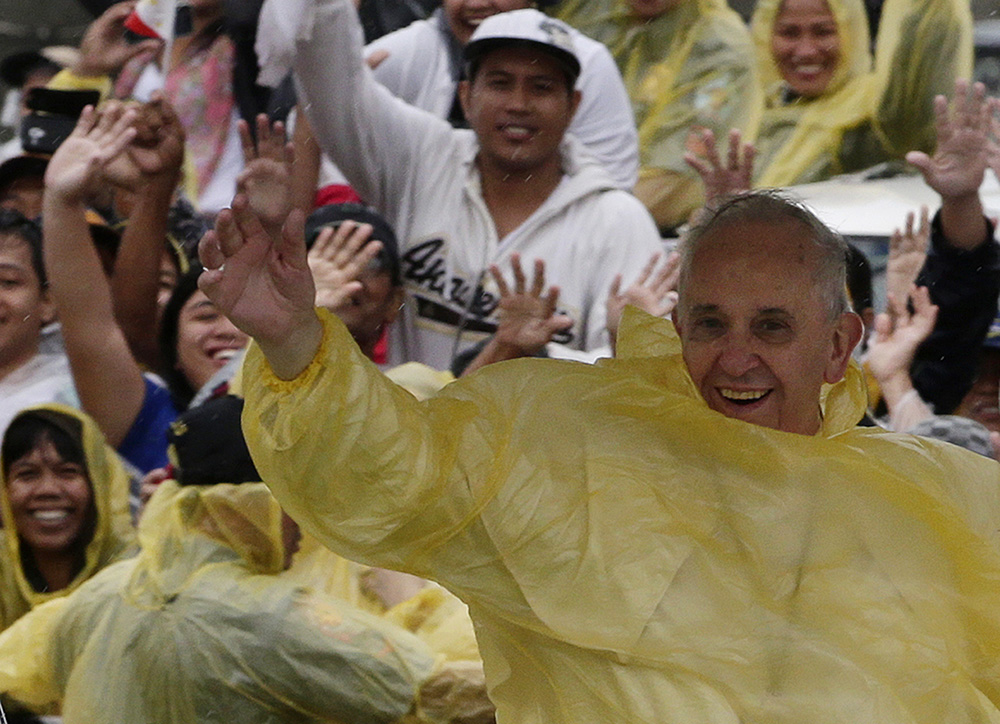
Pope Francis arrives in Tacloban City, the Philippines, on Jan. 17, 2015, as a rain-drenched but lively crowd wearing yellow and white raincoats welcomes him to the typhoon-ravaged city. (AP/Bullit Marquez)
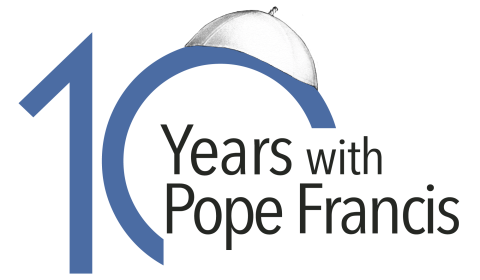
Six months before Pope Francis issued his landmark encyclical on creation, he found himself on the front lines of climate change, in the crosshairs of a storm heading toward Tacloban City in the Philippines.
Two years earlier, in November 2013, Super Typhoon Haiyan, the strongest-recorded typhoon to make landfall, had decimated the central Philippine city on the island of Leyte. Into that aftermath, in January 2015, stepped the leader of the Roman Catholic Church, donning a translucent yellow poncho over his white papal vestments, standing at an outdoor altar as yet another major storm bore down on the beleaguered city.
"When I witnessed this disaster from Rome, I felt that I had to be here," Francis said in his homily as rain poured down. "That is when I decided to come here. I wanted to come to be with you."
The scene was one of the many iconic moments in the decade since Cardinal Jorge Mario Bergoglio, archbishop of Buenos Aires, appeared on the balcony above St. Peter's Square for the first time as Pope Francis. The first pope to select as his namesake the patron saint of ecology, Francis of Assisi, he has emphasized concern for creation as a priority of the Catholic Church, and made ecology a central theme of his papacy.
Francis' decade as pope has been "both fundamental and disruptive," said Salesian Sr. Alessandra Smerilli, secretary of the Vatican Dicastery for Promoting Integral Human Development, primarily in his call for universal solidarity — across generations and with people and communities most vulnerable to a changing climate and ecological destruction — and in framing social and environmental crises as not separate but interconnected.
That solidarity was on display, she told EarthBeat, in the reception to "Laudato Si', on Care for Our Common Home," Francis' 2015 letter to the world, which was exhorted within the church as well as by governments, scientific bodies, nongovernmental organizations and others.
"It was as if everyone was waiting for something to shake their consciences. The pope was able to somehow channel attention, at least ideally, toward a common goal," she said.
With Laudato Si', Francis compiled the compendium of church teaching on ecology and explicitly linked it with the socioeconomic turmoil facing a world of climate change and rapid deterioration of ecosystems. His message has transcended the Catholic Church, melded the realms of faith and science, centered the most vulnerable, reimagined humanity's relationship with the rest of nature, and positioned him as a world leader on the many environmental challenges facing the globe.
"There is no doubt that the pope's voice is one of the strongest in the world, if not the strongest," said Christiana Figueres, the former executive secretary of the United Nations Framework Convention on Climate Change, and architect of the landmark 2015 Paris Agreement on climate change.
"He really has focused very much on the overlap, or the interdependence, of all life on Earth. ... Not on ecology over here and humanity over there. His focus on the web of life, the richness of the web of life, is to me the legacy of those 10 years."
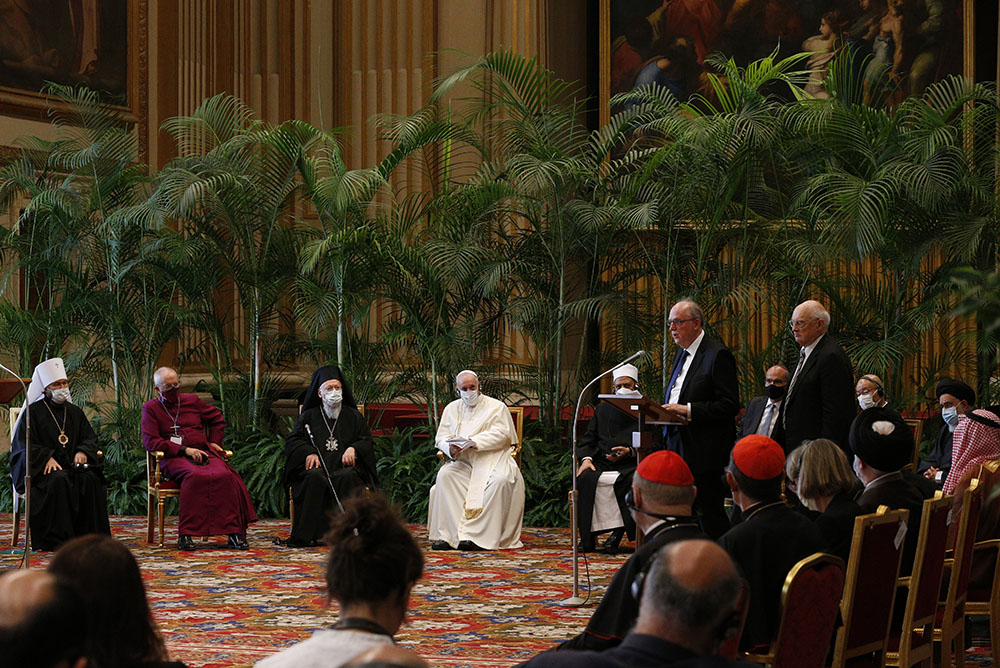
Pope Francis listens as Joachim Von Braun, president of the Pontifical Academy of Sciences, addresses the meeting "Faith and Science: Towards COP26" with religious leaders in the Hall of Benedictions at the Vatican Oct. 4, 2021. The meeting was part of the run-up to the U.N. climate change conference, called COP26, in Glasgow, Scotland, Oct. 31-Nov. 12, 2021. (CNS/Paul Haring)
From choosing a name to climate action in the church
Franciscan Sr. Sheila Kinsey recalls fondly being in the piazza when Pope Francis was introduced to the world on March 13, 2013. She and several fellow sisters had abandoned half-eaten apple cores and some tea on the table in their convent when the small picture-in-picture window on their TV revealed white smoke billowing from the smokestack atop the Sistine Chapel.
"It was so exciting to be there with one another," said Kinsey, who until this month was executive co-secretary of the Justice, Peace and Integrity of Creation Commission for the International Union of Superiors General.
Hours earlier, the sisters had speculated what name the new pope would pick. Their suggestion? Francis, and not just because of their congregational loyalties, "but in terms of the needs of the time — the poor, the environment, the engagement," Kinsey told EarthBeat.
Three days after his election, in an audience with media representatives, Francis, a Jesuit, explained why he selected the name of the 13th-century saint and composer of "The Canticle of the Creatures."
"For me, he is the man of poverty, the man of peace, the man who loves and protects creation; these days we do not have a very good relationship with creation, do we?" the new pope said.
From that starting point, Francis has pressed forward.
He has woven environmental matters into his letters, addresses and audiences, speaking about the vocation to protect all the created world; critiquing throwaway culture, where food is wasted while people starve; and championing universal access to food and water. Like his predecessors, he has observed environmentally themed days and delivered remarks to U.N. gatherings.
Those teachings and more were encapsulated in Laudato Si'. The first solo encyclical of his papacy, it was also the first papal letter devoted to ecology and humanity's role within the whole of creation.
Addressing the 184-page document to "every person living on this planet," he decried that the planetary home was becoming "an immense pile of filth." He linked the cry of the Earth with the cry of the poor, stated "the climate is a common good," and challenged social structures and political systems to imagine a new harmony with nature, replacing a dominating mentality that for more than a century has driven industrial growth.
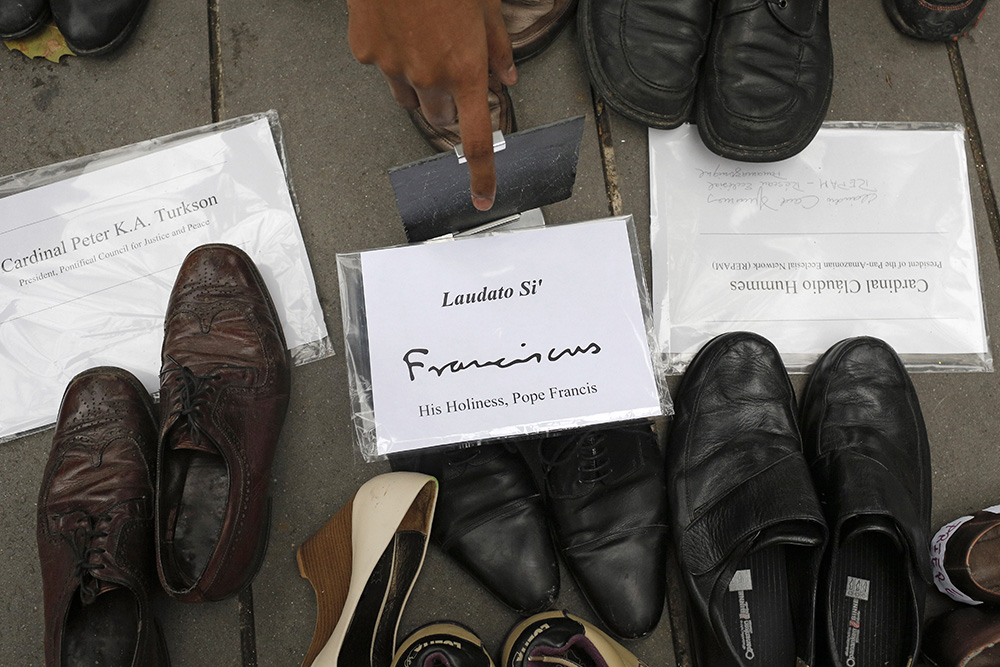
Pope Francis' shoes are seen in the middle of hundreds of pairs of shoes displayed at the Place de la République in Paris on Nov. 29, 2015, as part of a rally for climate action ahead of the COP21 U.N. climate conference, which began the next day. (AP/Laurent Cipriani)
"The urgent challenge to protect our common home includes a concern to bring the whole human family together to seek a sustainable and integral development, for we know that things can change," he wrote.
The document, a copy of which was leaked ahead of its June 18, 2015, release, was heralded both inside and outside the church, by other faith denominations, and by scientists who affirmed the text got the science right, particularly on climate change. Before and after publication, it also drew fierce criticism from the right, with some conservatives calling Francis a Marxist, anti-modern and the "Red Pope."
"[Laudato Si'] remains the most important document of the millennium on the climate crisis, and indeed among the best critiques ever issued on capitalism, consumerism, and our strained and unequal modernity," wrote longtime climate activist Bill McKibben in a February 2023 essay in The New Yorker, repeating a claim he has made since its release.
While the pope's voice amplified environmental concerns worldwide, Francis also took steps to instill care for creation as essential to Christian life. He designated Sept. 1 as the World Day of Prayer for the Care of Creation, and encouraged Catholics to celebrate the ecumenical Season of Creation, beginning that day and extending to Oct. 4, the feast of St. Francis of Assisi.
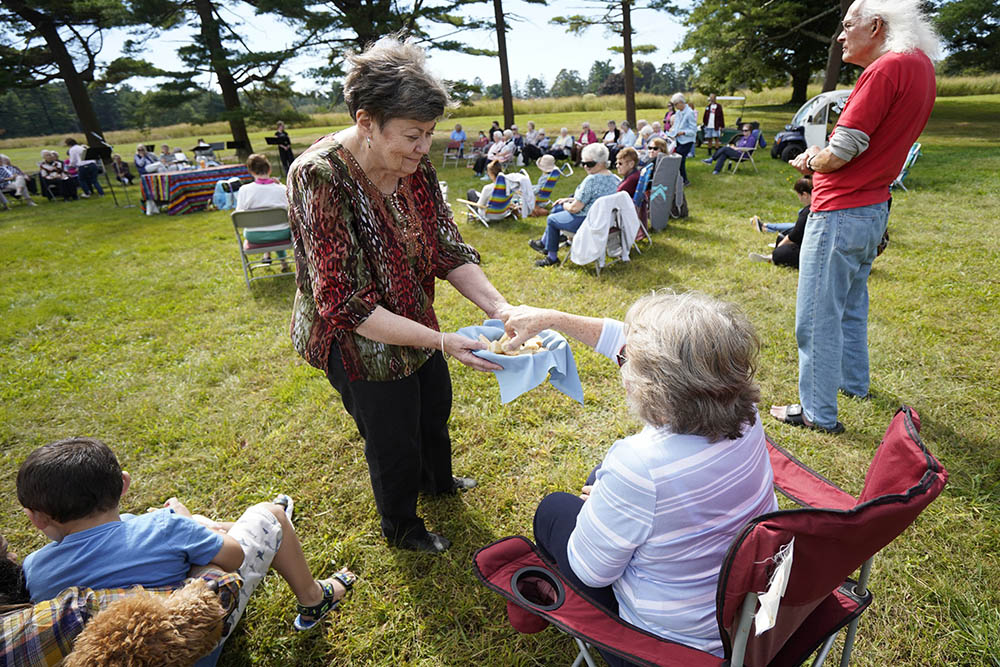
Sr. Maryellen Kane, executive director of the U.S. Federation of the Sisters of St. Joseph, distributes organic bread during a prayer service marking the Season of Creation at the motherhouse of the Sisters of St. Joseph of Brentwood, New York, Oct. 3, 2021. (CNS/Gregory A. Shemitz)
In 2016, Francis endorsed adding "care for our common home" to both the corporal and spiritual works of mercy. He later said that ecological sin would be added to the Catechism of the Catholic Church.
And in May 2021, he unveiled the Laudato Si' Action Platform, an ambitious multiyear initiative to mobilize Catholic institutions to act on the themes laid out in the encyclical.
In December 2020, he set a goal for the Vatican City State to become carbon-neutral no later than 2050, a commitment made ahead of the Holy See in October 2022 formally joining the Paris Agreement and becoming a party to the U.N. Framework Convention on Climate Change.
His papal example has spurred actions on environmental issues from countless Catholic parishes, schools and other institutions around the world, and even gave birth to new ones, including Laudato Si' Movement and the Laudato Si' Research Institute at Oxford University. Rodne Galicha, executive director of Living Laudato Si' Philippines, said in his country, nearly 80% Catholic, the church at all levels has become "more visibly proactive" in addressing ecological concerns, with the Philippine bishops issuing two pastoral letters on ecological citizenship and the climate emergency.
"There has been a higher awareness among Filipino Catholics in sustainable living and caring for life ... We have observed more individuals and communities conduct campaigns and initiatives on ecological education, fossil fuel divestment, food self-sufficiency, climate action, and upholding human rights and dignity grounded on Catholic social teachings, such as the Laudato Si'," Galicha told EarthBeat.
Of all the messages and actions, Kinsey said to her raising the moral dimension within socioenvironmental issues has been Francis' greatest contribution. Specifically, the concept of "integral ecology" that defines a single social-environmental crisis where one half cannot be solved without addressing the other.
Among religious congregations, longtime leaders in the church on eco-justice matters, Francis' papacy has affirmed and validated decades-long ministries, Kinsey added. Now, as they work to actualize the pope's call, including through the Sowing Hope for the Planet campaign, she sees ecology as "the new frontier" in the way health care and education have guided their ministries for centuries.
"The challenge that he has for us," Kinsey said, "is that we have to put it into practice, which is of course, what St. Francis would say."
Advertisement
Accompanying the vulnerable, influencing world leaders
As Francis celebrated Mass amid howling wind and rain in Tacloban on Jan. 17, 2015, AG Saño listened from afar elsewhere in the Philippines, in Cebu City. The storm prevented him from boarding a ferry to join the Mass in person.
Even at a distance, Francis' homily deeply touched Saño. He became emotional when the pope said that as Super Typhoon Haiyan, known locally as Yolanda, was wreaking havoc on Tacloban, he was thinking about the people there. People like Saño, who were stuck inside the city.
"I was left speechless," Saño told EarthBeat, adding, "I felt like he was literally embracing me, because I had the flashback of that moment when I felt so helpless being trapped."
Living through Haiyan was a turning point in climate activism for Saño, a Catholic and street artist from Manila. He recalls in vivid detail his seven days in Tacloban, from when he arrived ahead of the typhoon as a volunteer to help in the aftermath, to riding out the storm in a building — with glass windows and doors imploding as feelings of helplessness and isolation washed over him — to working on a cadaver recovery crew gathering thousands of bodies floating in the knee-high waters covering the streets.
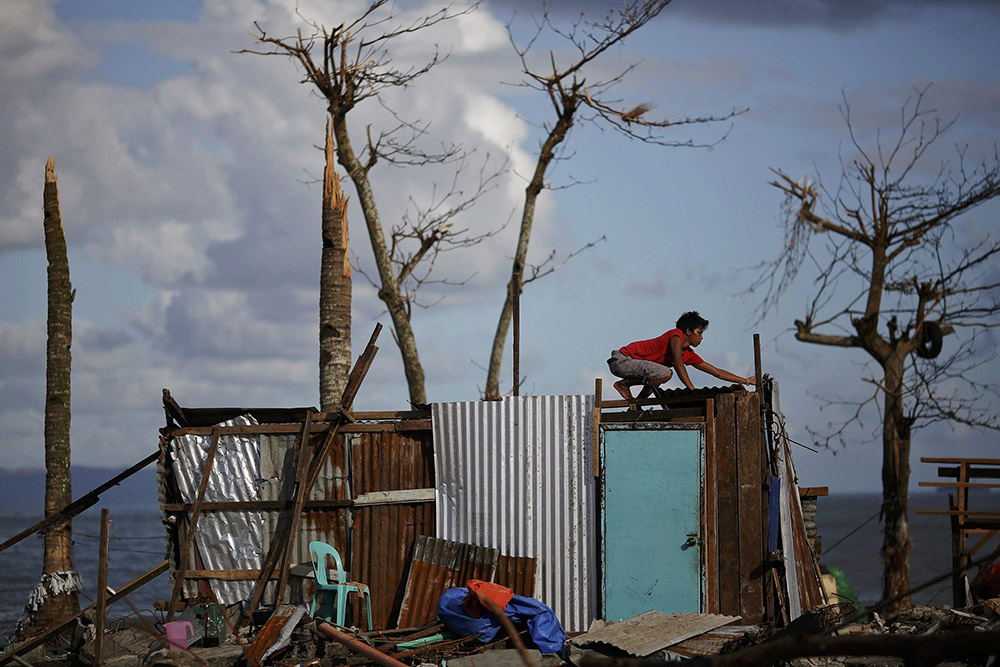
A man repairs his house, which was damaged by Super Typhoon Haiyan, at a coastal area south of Tacloban, the Philippines, Nov. 16, 2013. (CNS/Reuters/Damir Sagolj)
Months after Francis' visit to Tacloban, Saño and his brother Yeb, then the lead negotiator for the Philippines delegation at the U.N. climate summits, were among pilgrims who marched from Rome to Paris ahead of the COP21 U.N. climate conference. After a Mass at St. Peter's, the group briefly met with Francis.
"I was so starstruck that I couldn't move," AG Sano said.
While the pope did not join the journey to Paris — though his shoes did — Francis made no secret of his desire for a strong global pact on climate change to emerge from the high-level meetings, and his hope that Laudato Si' could influence the negotiations, which for years had struggled to reach an agreement where all nations committed to significant and proportionate emissions reductions.
Ahead of COP21, Figueres, as the U.N.'s top climate official, had sought to engage various constituencies, including religious communities, to create groundswell for an impactful climate deal in Paris. When she learned that Francis was preparing a papal letter on humanity's relationship with the rest of nature, she was "thrilled."
Figueres, who is co-founder of Global Optimism, praised the encyclical for connecting protection of the planet with protection of the poor and for stating clearly climate change requires more than a technological fix. She told EarthBeat Laudato Si' was an important contribution in articulating the consequences of technical decisions negotiators at COP21 were debating.
In the eight years since the Paris Agreement was adopted, Francis has continued to engage the international climate arena, pressing countries to live up to their decarbonization pledges, especially after the top U.N. climate science body reported that the world was on track to eclipse 1.5 degrees of warming as soon as the 2030s.
Ahead of COP26 in Glasgow in November 2021, Francis hosted an unprecedented gathering of global faith leaders, who issued a unified appeal calling on nations to take "urgent, radical and responsible action" to drastically curb greenhouse gas emissions.
Iyad Abumoghli, director of the Faith for Earth Initiative of the U.N. Environment Programme, said that Francis has been an environmental leader among religions, with Muslim scholars developing an Islamic complement to Laudato Si', a document he called "revolutionary." Abumoghli credited the pope with "bring[ing] back the spiritual aspect of the relationship between humans and the environment," which had long gone ignored.
"It was only when Pope Francis brought it back to life in 2015 that the international community started taking this relationship seriously," he told EarthBeat.
Francis has raised ecological concerns in TED talks and Earth Day messages, and met with young climate leaders like Greta Thunberg and Vanessa Nakate. He participated in President Joe Biden's two-day climate leaders summit and stated the importance of achieving the Paris climate goals in meetings with world leaders at the Vatican and during papal trips.
He also met with the primary source of planet-warming emissions, the fossil fuel industry. In two meetings at the Vatican, Francis invited executives of the world's largest oil and gas companies into dialogue about a global energy transition to renewable sources, telling them that "time is running out" and "civilization requires energy, but energy use must not destroy civilization."
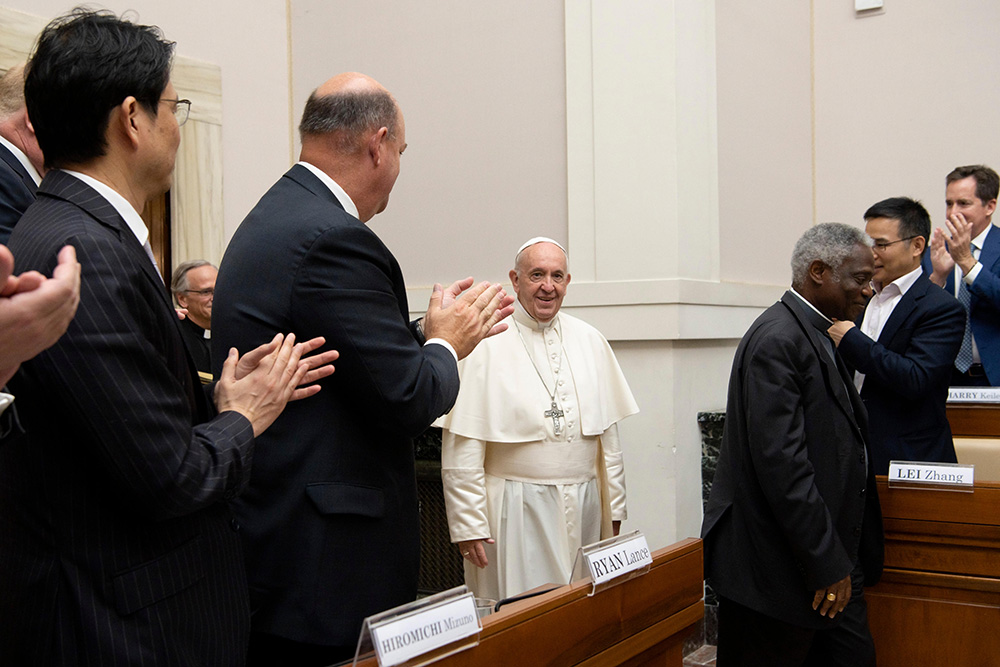
Pope Francis arrives for a meeting at the Vatican June 14, 2019, with executives of leading energy, petroleum and natural gas companies, leaders in investment firms and climate scientists. "Today's ecological crisis, especially climate change, threatens the very future of the human family, and this is no exaggeration," he told them. (CNS/Vatican Media)
Figueres said the most important thing Francis can do is to continue conversations with the fossil fuel industry, and press it to invest skyrocketing profits — $220 billion for oil companies alone in 2022 — into clean energy sources and to establish a fund for nongovernmental organizations and small companies to provide electricity to the 800 million people without it.
"This is a moral responsibility. We cannot continue to expand the gap of inequality in the way that it is right now in the year 2023," she said. "It is completely unacceptable. And Pope Francis is the one person who has the moral ground to make that call. No one else can do it."
Life support for the 'lungs of our planet'
With his most recent overseas trip Jan. 31-Feb. 5, Francis has now visited both the Amazon rainforest and Congo River Basin, what he described in Laudato Si' as "those richly biodiverse lungs of our planet."
With his first address in the Democratic Republic of Congo, Francis condemned exploitation of the country and its natural resources, including for emerging green technologies. "Hands off Africa!" he declared. "Stop choking Africa: It is not a mine to be stripped or a terrain to be plundered."
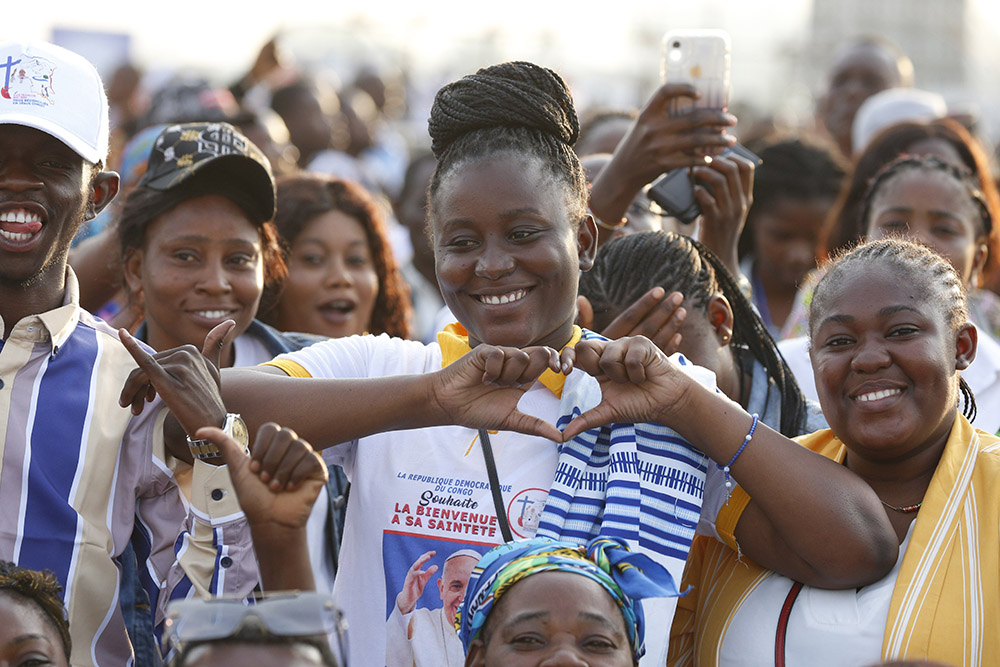
A young woman gestures in the shape of a heart as people wait for the start of Pope Francis' celebration of Mass at Ndolo airport in Kinshasa, Congo, Feb. 1, 2023. (CNS/Paul Haring)
It was a moment that "Congolese women and men were waiting for," said Jesuit Fr. Jacques Nzumbu, a Congolese priest and specialist in conflict minerals and renewable energy technology. He credited the pope for connecting the nearly 30-year war in the country with the fight for conflict minerals like copper and cobalt used in smartphones, computers and batteries.
Francis, a pope from the Global South and the first from South America, delivered a similar refutation of exploitative mining and extractive practices during his January 2018 visit to the small city of Puerto Maldonado, in Peru's Amazon Rainforest, where he met with thousands of Indigenous people, telling them, "The place on which you are standing is holy ground."
"Great business interests want to lay hands on [the Amazon's] petroleum, gas, lumber, [and] gold," the pope told them. "The native Amazonian peoples have probably never been so threatened on their own lands as they are at present."
He continued, "Amazonia is not only a reserve of biodiversity but also a cultural reserve that must be preserved in the face of the new forms of colonialism."
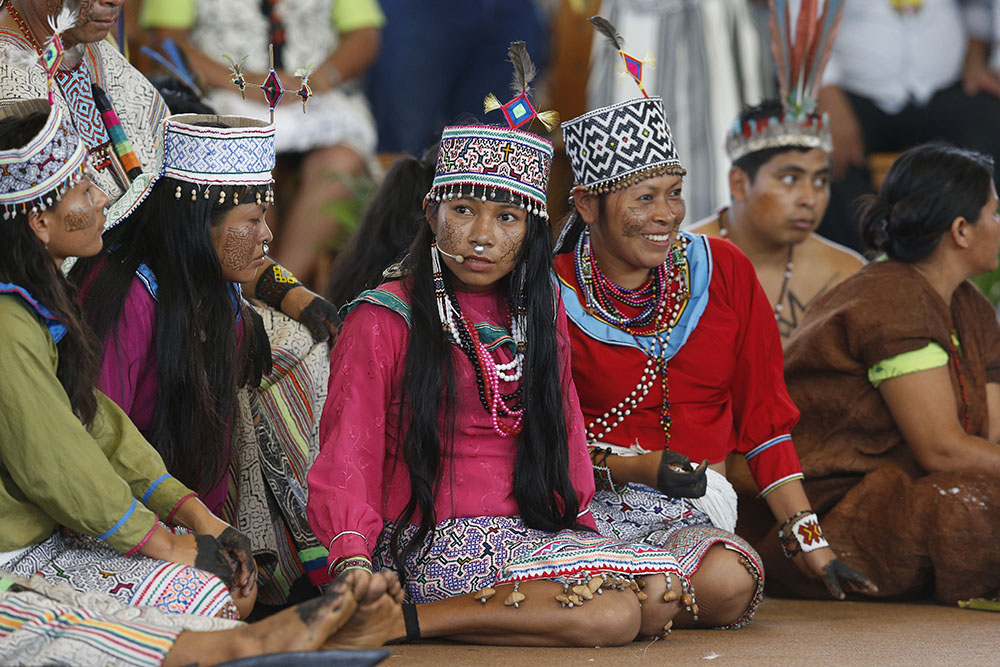
Young members of an Indigenous group from the Amazon region listen during a meeting with Pope Francis Jan. 19, 2018, at Madre de Dios stadium in Puerto Maldonado, Peru. (CNS/Paul Haring)
Seeing the pope meet with Indigenous communities before Peru's political leaders was "quite remarkable," said Mauricio López, executive secretary of the Ecclesial Conference of the Amazon and co-founder of the Pan-Amazonian Ecclesial Network (REPAM) who was present in Puerto Maldonado. It was a sign of his desire to be close with people who are suffering and a message to the rest of the church, López told EarthBeat.
"There are Catholics in the Amazon region which are to be respected in their own identity, in their own ways of being, in their own wisdom. And this should be something to be embraced by the whole Catholic Church. This is what Pope Francis is teaching us," he said.
A year after his visit to Puerto Maldonado, Francis held the Amazon synod at the Vatican, bringing together nearly 200 bishops to examine threats to the globally critical biome and its people and to chart a path forward to reverse their destruction.
Francis followed up that monthlong gathering with his apostolic exhortation Querida Amazonia, where he called harm of the Amazon and its Indigenous caretakers caused by businesses "injustice and crime."
"We must say it. He has supported us in our fight," Patricia Gualinga, a Kichwa leader in Amazonian Ecuador and the first Indigenous representative to the Ecclesial Conference of the Amazon, told EarthBeat.
She added that for her, Francis' papacy has fundamentally "put the periphery at the center."
Efforts to implement the Amazon synod's proposals continue, including a possible Amazon rite. What began in Puerto Maldonado has now spread to other corners of the church, López said, through its influence on the ongoing synod on synodality and through other regional ecclesial networks that have formed in other critical ecosystems, including Central America, Oceania and the Congo Basin.
The call of Laudato Si' has been welcomed in Congo and other African countries, Nzumbu said. The formation of the Ecclesial Network of the Congo Basin Forest (REBAC) is a sign of how it is inspiring action within the church to confront the exploitation of people and natural resources.
Ashley Kitisya, a fossil free campaigner with Laudato Si' Movement, based in Nairobi, Kenya, said that Francis' papacy has provided "a sense of renewed hope" for Catholics in Africa, a continent that has contributed the least to climate change but is among the most vulnerable places to its impacts.
"I hope to see more involvement from the church and its institutions by taking up the next step towards zero fossil fuels by divesting and phasing out fossil fuels in Africa," the 25-year-old environmental activist said.
Added López, "There are some strong signs of accompanying the pope in what he has been calling us to do these past 10 years. But we need to do a lot more. We need to be up to the task that we have been given by the pope."

